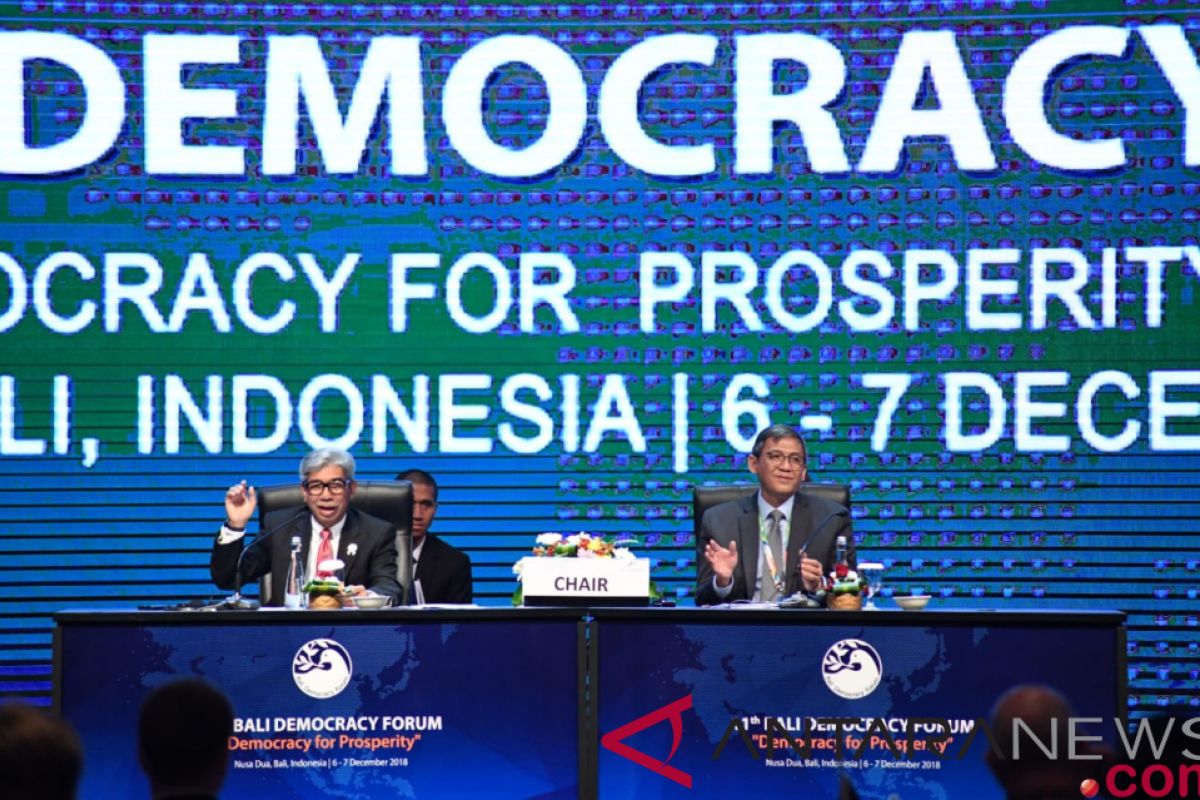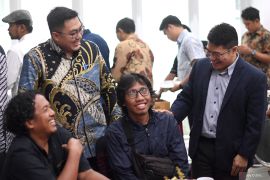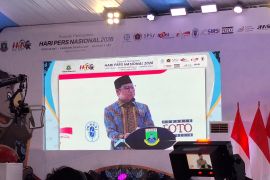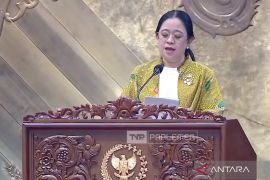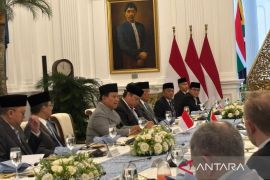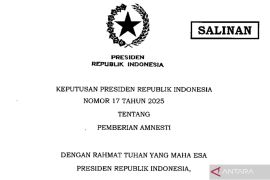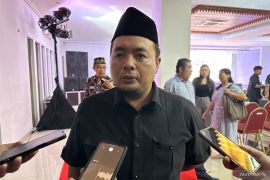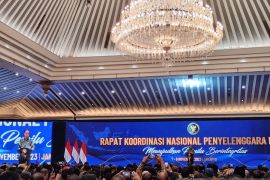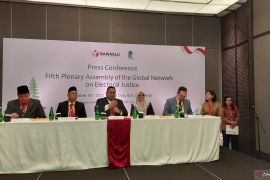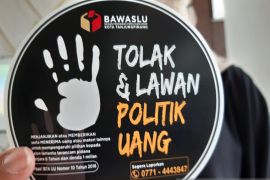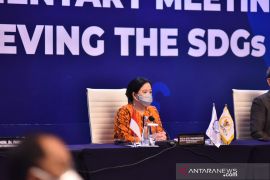The theme of this year`s BDF was Democracy for Prosperity, which is a continuation of last year`s discussion on whether democracy is able to deliver its promises.
The 11th BDF, held on Dec 6 and 7, 2018, was attended by over 500 delegates from 91 countries and 7 international organizations.
Participants to the forum conveyed their appreciation to the Government of Indonesia for its continued commitment to promote democracy as a regional agenda.
After a decade, BDF remains a significant force to promote the principles of democracy, which upholds the values of pluralism, diversity, and inclusiveness, and is centered on home-grown initiatives.
Today, the forum has transformed itself into more than a vehicle for sharing experience in the field of democracy.
It has become a venue for participants to strengthen networks and cooperation as well as explore ways to reap the benefits of democracy.
As such, this year`s forum focuses on pertinent issues that include institutional building, prosperity and economic justice, technology and innovation, equality, and sustainable development.
This year, BDF was convened in parallel with two other fora, namely the Bali Democracy Student Conference (BDSC) and Bali Civil Society and Media Forum (BCSMF).
BDF has also expanded its outreach to neighboring regions, starting with a BDF Tunis Chapter in 2017, followed by a BDF Berlin Chapter in 2018.
These chapters reflect international recognition on the relevance and contribution of the BDF towards promoting dialogue and cooperation in strengthening democracy.
At the opening session of the 11th BDF, in Nusa Dua, Foreign Minister Retno LP Marsudi said that BDF was a unique forum.
This is because it is a forum that embraces and strengthens democracy without finger-pointing exercises.
We all know well that democracy is not one-size-fits all and it is true. Democracy must be developed on homegrown values. It must create good governance and effective government. These are all the reasons behind our idea of having democracy, the minister stated.
However, ultimately democracy must bring prosperity to the people.
Indonesia began to embrace democracy only in a not-too-distant past, just two decades ago starting in 1998, the minister revealed.
"It is true that before 1998, the economic growth was high, and once it reached 8 to 10 percent," she remarked.
But Indonesian people needed more, and so they launched a Reformasi or reform. It was because they needed democracy, transparency, and good governance.
We have learned that high economic growth does not always mean equality or prosperity for all. That is why Indonesia chose democracy as a new path of development. We wholeheartedly believe that a democratic system will allow every individual to participate and thrive in the process of development and nation-building, the minister explained.
In a larger picture, despite the many challenges facing the Asia-Pacific, the outlook of democracy in our region has been positive, with net democratic progress having surpassed all other regions around the globe.
The Economist Intelligence Unit`s Democracy Index, for example, noted that for the past 10 years, the average score for democracy in Asia has increased from 5.44 in 2006 to 5.74 in 2016.
The minister expected that the BDF played its part in strengthening democracy in the region.
On the other hand, the state of democracy globally portrays a different image. In its 2018 report, Freedom House cites that in the last 12 years, democracy has in fact regressed.
The pillars, principles, and values of democracy are being challenged in countries traditionally known as champions of democracy.
Several countries have chosen to turn a deaf ear on the voice of the people, vox populi. The press is being undermined. Social media is being used to spread hoax and hate speeches for narrow political interests.
More alarmingly, democracy and democratic institutions are being misused to spread anti-democratic values, making a shift towards Illiberal Democracy.
Apart from that, there is also a global question on why democracy is experiencing a standstill, and to an extent, even Regressing.
There are perhaps a number of causes to this dire situation.
"But in my view, one of the key reasons is that democracy and its benefit has not been inclusive enough. Many members of society remain marginalized. Democratic institutions have been failing to provide a sense of security for all, an equitable prosperity for all, and a protection for pluralism and diversity," she pointed out.
In short, democratic institutions are viewed as failing to deliver the fundamental needs of the people.
That is why we see the erosion of public trust in democracy, she added.
Against the background, our collective duty is to ensure that the positive development of democracy in the Asia Pacific continues would grow by rectifying the view that democracy has failed and by restoring people`s trust in democracy.
Even though democracy is not a perfect system, it provides sufficient space for all voices to be heard.
"What the world needs is an inclusive democracy," the minister noted.
Democracy unites and not divides. Democracy provides hope and not fear. Democracy empowers and weakens.
In this connection, inclusive participation from all stakeholders is vital.
"First, the private sector must contribute to creating an inclusive democracy," the minister remarked.
The private sector must become the driving force in achieving inclusive prosperity. The private sector can not only become a partner in development but also the government`s reliable partner in the strengthening of democracy. The private sector must be at the frontline in providing a solution, the minister stated.
"Second, we must empower our millennials. As I mentioned earlier, the future of our democracy belongs to the youth, the millennials. They provide the much-needed new energy and new life for inclusive democracy. Therefore, we must prevent the youth from being apathetic towards democracy," she explained.
She added that millennials can make democracy more colorful. Their positive energy and creativity can spur innovation.
Facing the Fourth Industrial Revolution, our millennials` technological savviness and exposure to social media can create new opportunities in achieving inclusive democracy, she stated.
Today`s technology enables closer and more direct contact between the people and their leaders. Through social media, millennials can directly communicate their aspirations, criticisms, and circumvent bureaucratic red-tape, to which governments are able to understand and address the needs of its people more effectively, more quickly, and even in real-time.
Third, women must become strong pillars in inclusive democracies. Women play an important role in social transformation.
Furthermore, women have natural qualities in garnering consensus and peaceful solutions. These are the keys to resolving political stagnation and enabling democracy to provide beneficial results for the people.
As the BDF enters its second decade, with ever greater challenges to democracy, the BDF will also need to rise to the occasion to help the region meets these challenges.
The convening of BDF chapter Tunisia and Berlin in the last two years is one example of BDF rising to contribute to the democracy discussion in other regions.
"I am confident that BDF will continue to evolve to meet today`s challenges. For this, I call upon all of us to guard democracy for the interests of our peoples. This is a high time for us all to unite in the strengthening of our democratic path," the minister remarked.
Active role of parties
Indonesian Vice Foreign Minister, A.M. Fachir reaffirmed the importance of democracy that is inclusive for all people as well as the importance of the active role of parties in their efforts to achieve it.
To achieve inclusive democracy, the participation of all stakeholders is very important, particularly for the private sector, youths, and women, he stated.
The application of current democracy at present still faces challenges in many ways.
In this case, Indonesia proposed an Inclusive Democracy to answer the challenge.
Inclusive democracy is a democracy which is uniting, not separating, giving hope, not scaring, empowering, and not weakening, he remarked.
As a continuous effort, he noted, democracy cannot be a measure of the success and welfare of a country.
Welfare itself cannot be assessed from the economic situation of a country, and democracy is a joint enterprise because it requires respect, recognition, partnership, and inclusiveness.
Democracy requires respect, recognition, and inclusiveness, the vice minister pointed out.
Editing by Bustanuddin
Reporter: Azis Kurmala
Editor: Yosep Hariyadi
Copyright © ANTARA 2018
